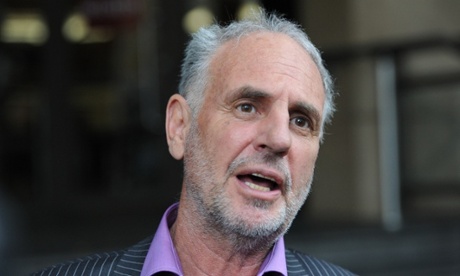Controversial doctor says attempt to deregister him is based on a biased ABC report about the suicide of Perth man Nigel Brayley

Euthanasia campaigner Philip Nitschke says he will fight an attempt by the Medical Board of Australia to deregister him because it is based on a biased television report.
Nitschke also claims Nigel Brayley, the Perth man the ABC says died in May after communicating with him, was a serial killer who took his own life to avoid jail.
The doctor told media on Thursday he was seeking footage from the ABC to prove its report on Brayley was biased. He has 48 hours after this to make his case to the MBA, he says.
Brayley was not depressed, Nitschke said before hosting an information session about voluntary suicide in Melbourne.
He said the 45-year-old died after taking euthanasia drug Nembutal because he feared he would be charged with his wife’s murder.
He had attended an Exit International workshop about three months prior and purchased the banned Peaceful Pill eHandbook, written by Nitschke.
Brayley’s former wife Lina, 37, died in February 2011 after she fell from the top of Perth’s Statham’s Quarry while taking photographs.
After Brayley died, it was revealed he was being investigated for alleged involvement in her death.
Nitschke says it was a “a clear case of rational suicide” and supported Brayley’s right for access to the information and drugs.
Nitschke said he was told of the move to deregister him on Wednesday but was confident it would not go ahead.
He claimed the board was acting “under pressure” from other medical professionals after the ABC report about Brayley’s death screened.
“The fact (the ABC) didn’t present a balanced report is what’s led to this medical board action and we will be challenging that as they seek to make their decision,” Nitschke said.
He claimed the ABC report “falsely depicted” Brayley as a vulnerable patient of his and implied the doctor should have referred him for counselling.
“My relationship with him was certainly not a doctor-patient relationship. He was a person I had scant dealings with. He had obtained lethal drugs before he even talked to me,” Nitschke said.
“[Mr Brayley] made a decision his life was in serious trouble and the sensible thing to do, in his estimation, was to end it rather than go to prison for a very long period of time.”
His lawyers were seeking interview transcripts from the ABC, Nitschke said.
He also told media he could not prove Brayley was a serial killer who “probably” murdered three previous partners, but said it would be substantiated.
• Readers seeking support and information about suicide prevention can contact Lifeline on 13 11 14 or the Suicide Call Back Service on 1300 659 467.
